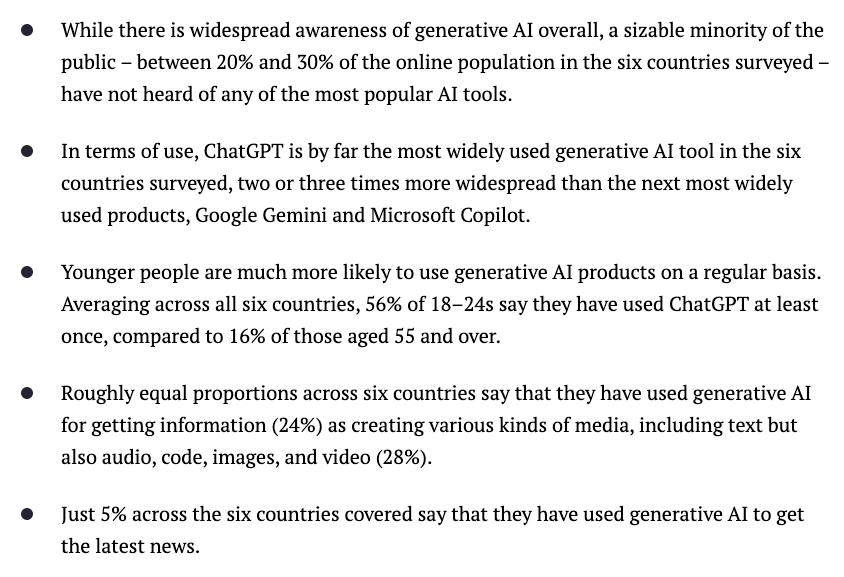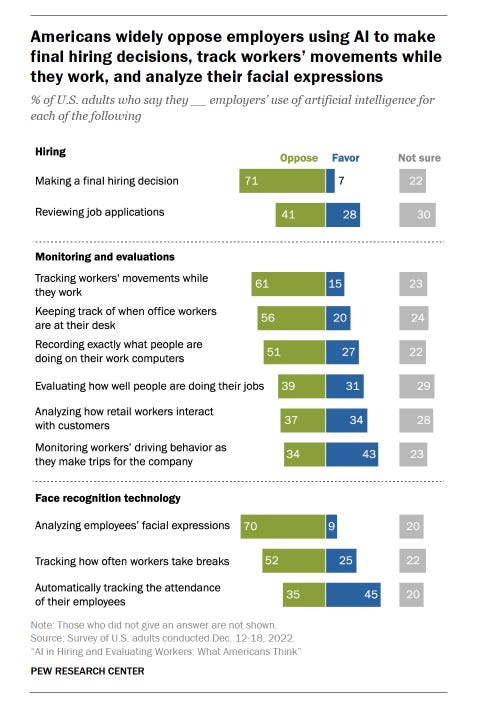I love AI usage surveys. Today, I came across a new one- this one with a focus on "how the public in six six countries thinks of generative AI in the news."
The study, conducted from Reuters and the BBC, included a great deal of usage and awareness data. While most people have heard of generative AI, few are using it:
But, then I started thinking- we've had a lot of these "how people are using AI" surveys over the past two years. How useful are these surveys? Why do some of these surveys show conflicting data? And, what does all this data tell us about AI usage?
Conflicting Survey Results
Over the past two years, numerous surveys have reported different levels of AI usage. Such variations can be attributed to differences in sample populations, methodologies, and the rapidly changing nature of AI technology.
For example, a SurveyMonkey study revealed that 75% of marketers found AI made their jobs easier, although 27% also feared for their job security.
According to a Salesforce survey, 56% of AI users struggled to get desired results, 51% believed generative AI lacked useful information, and 54% distrusted the data used to train AI systems. Notably, 82% emphasized the importance of accurate and secure data for building trust in AI.
The Pew survey showed that Americans are cautious about the growing role of AI in their lives, with 52% of Americans more concerned than excited about AI in daily life.
The Pew research study also polled teens about their opinions regarding ChatGPT for research versus essay writing.
And, interestingly enough, the Pew Research Survey didn't just focus on "Will AI Take My Job?" They focused on the broader issue of 'should AI be involved in deciding if I get the job?'
Why Do These Surveys Conflict?
Several factors contribute to the conflicting results observed in these surveys. The primary reason is the differing sample populations. For instance, Pew Research surveys the general U.S. adult population, while other surveys might focus on specific groups like students or educators, leading to variations in AI awareness and usage rates.
Another key factor is the diversity in survey methodologies. Some surveys use online panels, while others rely on phone interviews or different question wordings, which can significantly influence the results.
Lastly, the rapid evolution of AI technology means that surveys conducted at different times can show varying results. As AI tools become more integrated into everyday life, the rates of awareness and usage can change quickly.
These factors highlight the importance of considering the context and methodology of each survey when interpreting their results.
What Could Be A Better Indicator of AI Usage?
While surveys provide valuable snapshots, observing organic adoption trends might offer a clearer picture. Alternative indicators include the integration of AI into everyday devices, real-world applications, and user engagement metrics.
As AI becomes a standard feature in smartphones, virtual assistants, and personal computers, its usage will likely increase naturally, providing a more accurate gauge of AI adoption. Monitoring the uptake of AI tools in specific industries, such as healthcare, education, and finance, offers insights into how AI is solving real-world problems.
Final Thoughts
While surveys offer useful insights, they often paint different pictures due to varying methodologies and sample groups. Observing how AI tools naturally integrate into daily life will provide a more accurate understanding of their adoption. As AI becomes more embedded in our devices and routines, its usage will grow organically, driven by real-world utility and user experiences.
Crafted by Diana Wolf Torres, a freelance writer, harnessing the combined power of human insight and AI innovation.
Stay Curious. Stay Informed. #DeepLearningDaily
Additional Resources for Inquisitive Minds:
Hardly any of us are using AI tools like ChatGPT, study says – here’s why. Mark Wilson. TechRadar. May 29, 2024.
• Pew Research: Majority of Americans Have Heard of ChatGPT
Follow "Deep Learning with the Wolf" on Spotify:
Yesterday's episode was: "Why Model's Leak."






















Share this post